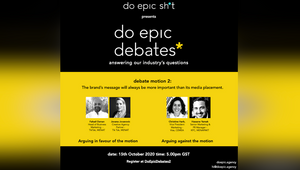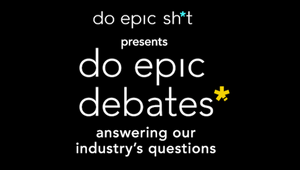
5 Minutes With… Ramzi Moutran

Ramzi Moutran is in love with advertising. With an infectious ability to see the power to do good through his work, his career has taken him through Beirut, Cape Town, London and now Dubai. As the result of a sabbatical during which he decided he wanted to ‘set a fire under my ass’, he set up Do Epic Sh*t in early 2018.
The agency, which has offices in Dubai and London, with a partnership in Cape Town, has since been working on some of the most groundbreaking work we’ve seen over the past couple of years. The Hidden Cities campaign for Uber saw a content series featuring stories told by residents of a city talking us through their favourite local haunts, accompanied by a link to the Uber app to take them straight there.
To look back on Ramzi’s creative journey, as well as reflect on the origins of Do Epic Sh*t, LBB’s Adam Bennett spoke to the entrepreneurial creative.
LBB> When did you first know you were going to be a creative?
Ramzi> I think I was around four years old. I was in a creative department - my father was in advertising and he opened his own agency. I kind of grew up playing in the creative department with the creatives there!
I guess I’ve always been around ‘Ad men’ - the old, ‘proper’ ones. Their stories, their lifestyle, the whole world of advertising, I’ve always loved it and enjoyed what it can do. I’ve always had this appreciation of the way it can change our culture and change the world, of course with brands but also the good it can do humanity. It can also be quite negative if it’s used badly, as we’re unfortunately seeing a lot these days.
LBB> Is there a specific campaign that you remember bringing home that realisation of the power of advertising to do good?
Ramzi> Well I think the one that comes to mind really easily is the simple stuff that Dove have done. Trying to improve the image of women’s bodies and help them believe in their bodies.
I also have to mention the stuff Nike has been doing where they are taking a stand on their belief. I think advertising has always had an important place in culture. And I think the creatives and the brands who have understood that are the ones who have done the most remarkable things. I think there are some amazing brands who have helped to do good and make a bit of a change.
That's something that's been driving me throughout my career as well. For example one of my proudest moments was working on the UN Women campaign 'The Autocomplete Truth'. I felt we were saying something really important with that campaign and it won the region's first ever titanium lion, as well as the first effectiveness Lion.
LBB> There’s quite a sweet idea of this kid Ramzi playing around in the creative department where your dad worked. Is there a specific memory you have of that or is it a general nostalgia?
Ramzi> No, there’s no specific memory… I mean I used to go to work with him on weekends or sometimes when I came home from school. I would always take a right turn at the door and run to the end of the corridor to where the creative department was! Immediately the guys would know me and they would set up the airbrush and I’d play with that as that’s how they used to do artworks. They used to actually paint and draw and it was this beautiful scene of it all coming together. Those artists were true artists. Things couldn’t be changed at the last second on a computer, you had to really think about it. There was a beautiful elegance to the whole process of creating work, thinking of the ideas and physically making the artwork.
I love that process. One thing that I think we have lost a bit today is this idea of true crafting. Anyone can make an ad in so many ways now and while there are advantages to that for sure, there’s a little bit of the craft that’s been lost.
LBB> What do you make of that ability we have now to go back and digitally change something if it’s not looking right?
Ramzi> I’ve always believed that you can’t complain about evolution. You’ve just gotta move with it and use it and adapt to it. Because it’s pointless complaining about change, that’s inevitable.
There’s one memory I have that really sticks out about this. I was on a jury in Cannes judging films, and we had this amazing debate for the Grand Prix about this pre-roll ad and whether it should win the Grand Prix or an amazing innovation in technology in film. I won’t mention what the ads were, but it was a remarkable debate. It took us hours and hours to get through it! I saw it as a debate between the future of where creativity should be going. Because we can either award the best technology ad, which YouTube had banned so every creative on the planet was thinking ‘I need to get the technology and hack the system to make a good idea’. Or you could stick with a six-second pre-roll ad and make that work.
And I’ve always believed you can’t fight the pre-rolls, like you can’t fight influencers. They are here. It’s just inevitable. I mean, radio guys must have been tearing their hair out when TV showed up! You’ve just got to move with it. For me personally coming from an art director background, sure there’s a loss of this craft. But you’ve got to move with it. Super fast ads are important now, and so is making them in hours rather than days or weeks.
LBB> So I guess that’s a craft within itself, right? Making a six-second ad that condenses everything you want to say?
Ramzi> Absolutely. Also, I think equally important now is the skill of making something not feel like an ad anymore. Because people don’t like advertising! And honestly, sometimes I wonder who can blame them. It’s one of the reasons why, with the agency I set up, we are trying our best not to do ‘ads’ in the more traditional sense.
LBB> So with that agency, Do Epic Sh*t - what counts as epic shit?
Ramzi> It’s funny because when I present the name to most of our clients they will say ‘oh, we can’t do that kind of stuff’ and I explain it’s all relative to the place, the brief and for the market. Doing epic shit for a pharmaceutical brand is definitely different to doing it for a sports retailer or for a fashion brand. It’s all about what’s going to move the needle and get attention to your target audience and your brand in the medium you want to talk in. That’s what it’s all about. It’s about not doing wallpaper and stuff that we’ve all seen before. It’s about doing stuff that makes a difference, for the brand, for respecting the viewer and giving them something that they will enjoy. Something that will move the needle, that’s epic shit.
LBB> You’ve said before you want to keep the identity of a ‘boutique agency’. What’s the advantage for you in that?
Ramzi> I think the advantage is you get to work with great people and act on the ideas you enjoy in almost every brief. You get to talk to decision makers. Unfortunately the industry is becoming a very layered and hierarchical kind of system where getting to anybody who can actually make a decision takes weeks and months and there’s layers of softening the idea or softening the work before you get to a place where somebody can make a decision. And very often by the time you get there the strategy has changed, so it’s wrong.
Having a boutique-ish approach, I don’t actually like that word but it serves a purpose, means you are a senior person who can talk to senior people and make a decision in the same room, and then go off and act on it. And that’s the other part of our business- we don’t just think of the ideas, we make them too. We’re a production house and a creative agency at the same time.
That’s particularly an advantage when you consider another big challenge is that agencies are becoming very bad at delivery. And often delivery is considered so late in the process that the ideas can’t be made, often. It could be budget, or time, or anything that is unforseen can get in the way. So when you consider the delivery at the same time as you consider the thinking, and you’re speaking to people who can make a difference and make a decision, that’s where you get epic work from.
If you look at the best global work, you can often tell that there haven’t been fifty people on that job. And it probably didn’t take five years. It was smart people in a room, discussing ideas and maybe having a bit of guts and making it happen.
LBB> So were you motivated to set up Do Epic Sh*t in response to things you found in the industry?
Ramzi> Look, I don’t want to knock the industry! I love it, I love so many people in it. It’s not their fault. But yeah, before I started Do Epic Sh*t I went on a sabbatical for around a year where I decided what I wanted to do with my life. I decided I only know how to be an ad man, how to be a creative. I knew I needed to go back into advertising somehow.
So, I decided to build an agency that was hopefully different to a traditional agency. I didn’t look at a single agency model, I tried looking at other industries whose models I felt I could learn from. I started speaking to a lot of my clients, asking them what they were looking for from partner agencies. I was looking at other industries to get business model ideas from.
LBB> And which industries were those?
Ramzi> Well, for example, I tried looking at the law industry and the way law firms were structured. Where law firms have seniors whose role it is to maintain a relationship with their clients. And they also have specialties in certain aspects of the job. So one partner at the law firm would have a certain client and their specialty will be one type of law. If that guy needed some help with criminal law, he would go down the corridor to his partner in criminal law and bring the relationship to him. So it’s a senior-to-senior relationship, the juniors facilitate the work and get it made. But you also bring it to your partners when you expand.
So our expansion plan is not to go and hire more and more of the same people, it’s to go sideways and say we’re going to open digital and so we need a digital person who will come in with maybe some clients as well and join us. They will be the digital partner and my clients will get digital assistance from them, and their clients can get some creative experience from me. And that’s how we will grow. At the moment it’s done a lot with partners and freelancers collaborating with agencies and other companies until the time comes where they can actually merge.
LBB> So when it came to setting up Do Epic Sh*t, how did the actual nuts and bolts of setting that up work?
Ramzi> It was actually completely by accident to be honest. While I was on my sabbatical a client called and told me she had a brief, and asked if I could have a look at it. So I said sure, and I looked at it with my creative partner Dana Silwadi. Before long we realised we were sort of already pitching for it as an idea and then we won it, and I realised ‘oh shit, I need to make an agency so I can actually build this idea!’ And that’s kind of how it started. In parallel at the same time, Charney Magri and I were writing a content series called Catwalk to Creation and getting funding for that. So those were two separate gigs that made Do Epic. And on the back of that were able to win a couple of other briefs and delivered those. It’s kind of all grown from there!
LBB> Do you have a creative hero?
Ramzi> I have too many heroes, I have had the luckiest career ever. I’ve worked with some of the best people on the planet. My father Eddie Moutran is my first creative hero of course, setting up an agency back when no-one really did and making it incredible. Then I have the guys who taught me advertising in South Africa, Robyn Potter, Bob, Brian and Allan from the red and yellow school. In London it was Rory Sutherland and Cordelle Burke who I was lucky enough to work with quite a bit. I spent a lot of time with Paul Smith as well, not to mention Tam Khai Ming, Neil French and I got to spend some good time with Graham Fink. The list really does go on-I have so many, I must be the luckiest creative there is!
LBB> What do you do in your free time? Any current obsessions?
Ramzi> I’ve got way too many hobbies… So for the last 12 years I've been racing cars. Me and my family do 24-hour endurance racing. Me and my brothers are actually two times world champions in the 24-hour endurance series we race in so we’ve done pretty well there, we’re a very competitive family. So whatever we enter in we try and do well. Our racing motto is 'we race for fun, but its really fun to win'.
And then of course I love spending time with my family and travelling, and PlayStation! I spend maybe a bit too much time on PlayStation…










